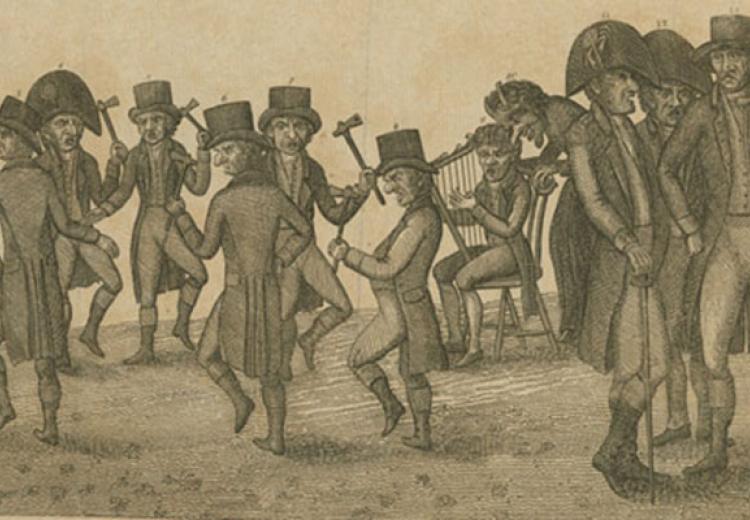Alexis de Tocqueville’s Warning: The Tyranny of the Majority

“First Blood.” This 1812 political cartoon shows the warring Federalists and Republicans planning to attack.
A French aristocrat visits Jacksonian America
In 1831, an ambitious and unusually perceptive twenty-five-year-old French aristocrat, Alexis de Tocqueville, visited the United States. His nine-month sojourn led to the writing of Democracy in America, universally regarded as one of the most influential books ever written.
The book is influential both for its study of American society in the Jacksonian period and for its analysis of democracy. In his introduction, Tocqueville writes: “In America, I saw more than America… I sought the image of democracy itself, with its inclinations, its character, its prejudices, and its passions. I wanted to know democracy, if only to know at least what we must hope or fear from it.”
A complex informational text such as this poses an invigorating challenge to high school students. With this challenge in mind, we have developed a new unit that focuses on one of the most famous and controversial of Tocqueville’s arguments.
Democracy’s greatest danger
Equipped with a deep understanding of the achievements and failures of European civilization and an equally deep passion for liberty and human dignity, Tocqueville was able to bring his complex perspective to bear on his subject. In America, he saw and praised a people who enjoyed an unprecedented equality of conditions and political and civil liberty without endangering order or prosperity. But he also saw and criticized the way white majorities supported the institution of slavery and the unjust treatment of free blacks and Native Americans. In fact, the greatest danger Americans faced was inherent in their treatment of unpopular minorities.
From the founding period to the time of his visit, Americans had become increasingly more egalitarian and democratic. The notion that the people can do no wrong became widely held. Tocqueville, in the light of his “new political science,” calls this an “impious and detestable maxim.” In Volume 2, Part 2, Chapter 7, “Of the Omnipotence of the Majority in the United States and Its Effects,” he lays out his argument against this view.
The power of the democratic majority arises from the fact that every individual is assumed to be competent to guide his own life and is politically the equal of every other individual. In this situation, the greatest legitimate power will always be with the majority.
In Europe, with its complex hierarchical societies, the majority has little or no power. It is rather the aristocracy, the clergy, the legal profession, and the rising merchant class—the independent centers of powers—that will resist and even oppose the sovereign. Some of these groups do exist in democracies, but they have little or no independent legitimacy.
According to Tocqueville, these “intermediary” institutions that exist in aristocracies serve as a “dike” against the force of dominant political power and a vital protection for human dignity and liberty. Because American democracy lacks such intermediary institutions, it has “no lasting obstacles” in the way of the opinions, prejudices, interests, and momentary passions of the majority and tends towards an unthinking despotism over unpopular minorities.
Tocqueville does not mean that the majority in a democracy will always act tyrannically, only that nothing can prevent it from so doing. He further argues that tendency to acquiesce in the rightness of majority opinion has negative long-term consequences on national character and culture.
A Common Core exemplar
EDSITEment’s new unit, Tocqueville on Tyranny of the Majority, breaks down Tocqueville’s argument into its component parts. The three lessons in this unit comprise key selections from the chapter. We have provided teaching guides and glossaries for the academic vocabulary, as well.
The first lesson introduces students to Tocqueville’s thesis about the omnipotence, i.e., the all-powerful character, of the majority in a democracy and his way of developing an argument through well-chosen historical examples.
In the second lesson, students consider the argument that unchecked political power will lead to tyranny. Tocqueville offers two gripping and illuminating examples: mob violence against anti-war journalists in the War of 1812; and the way free blacks are preventing from voting in the Northern states.
In the third lesson, students confront and evaluate Tocqueville’s most shocking claim—that there is less freedom of discussion and independence of mind in America than in Europe, with negative consequences for American character and culture.
Throughout, students are challenged to read carefully, think critically, and draw analogies between Tocqueville’s statements and their own experience and knowledge.
There is an assessment that offers a series of questions for students to answer in well-thought-out, short essays. In the extension activities, students are asked to bring to bear the knowledge that they have acquired in the unit on Tocqueville’s next chapter, in which he discusses the factors that might mitigate the tyranny of the majority.
